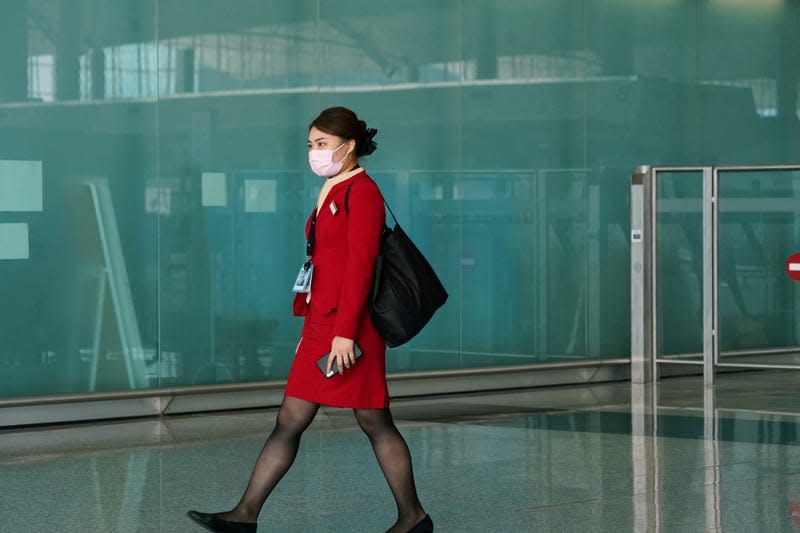Cathay Pacific is making amends after being accused of discriminating against mainland Chinese passengers

Cathay Pacific reportedly announced today (June 19) it will hire more Mandarin-speaking employees from mainland China and launch “culture training” on the language beginning in July. The decision is an apparent response to the discrimination scandal that rocked the Hong Kong-based airline, resulting in the firing of three employees in May.
“With the growing number of Putonghua-speaking customers, it has always been our intention to recruit a proportion of cabin crew from the Chinese Mainland after the pandemic,” said CEO Ronald Lam said in an internal memo, quoted by both Reuters and Bloomberg. “Putonghua” or “the common language” is another term used to refer to Mandarin Chinese.
Read more
All the sports that are part of Saudi Arabia's sportswashing plan
How many UBI trials do we need to prove giving away money works?
In May, a passenger aboard a flight from Chengdu to Hong Kong recorded what they allege were Cathay Pacific flight attendants making fun of a Chinese passenger’s English.
In the recording, a passenger appears to ask a crewmember for a “carpet” instead of a “blanket.” A flight attendant then replies: “If you cannot say blanket in English, you cannot have it. Carpet is on the floor. Feel free if you want to lie on it.”
Cathay Pacific yesterday apologized after a passenger exposed the airline discriminating non-English speakers. An online audio revealed chats of flight attendants making fun of some passengers: “If you cannot say blanket in English, you can not have it.” @cathaypacific pic.twitter.com/SU2tTVd9jk
— Yicai Global 第一财经 (@yicaichina) May 23, 2023
The clip spread rapidly across Xiaohongshu, a popular Chinese social media site, sparking widespread criticism from netizens and condemnation from Chinese state media. Cathay Pacific issued an apology and sacked the staff allegedly involved in the recorded incident.
Xinhua and People’s Daily took aim at Cathay Pacific
Following the release of the recording, China’s official state news agency, Xinhua, published an editorial (link in Chinese) questioning the company’s future, stating: “If old problems never change, how far Cathay Pacific can fly is a question mark.”
State-owned People’s Daily called for changes in the company’s culture in a post (link in Chinese) on social media site Weibo: “Cathay Pacific can’t just apologize, but should reflect on itself, make a serious rectification, establish rules and regulations, and solve the root of the problem.” It continued: “It seems that its company culture still maintains a sense of superiority that worships foreigners and respects Hong Kongers but looks down on mainlanders.”
Cathay is in the crosshairs of Beijing’s language politics
Language has long been a flashpoint for political conflict between mainland China and Hong Kong. The vast majority of Hong Kong speaks Cantonese, but since the former British colony’s return to China in 1997, the number of Mandarin speakers has been on the rise. Also known as “putonghua” or “the common language,” the growing use of Mandarin has been a part of Beijing’s strategy to exert more control over Hong Kong.
The growing use of Mandarin on the island, and presence of mainland Chinese visitors, has also ramped up tensions. Chinese tourists have claimed that Hong Kongers are less-than-friendly to Mandarin speakers. Those reports have increased since China lifted covid border restrictions and travel between Hong Kong and the mainland has started to pick up again.
Meanwhile, Cathay Pacific, after suffering three years of losses due to pandemic rules, is seeking to ramp up business, a large portion of which comes from Chinese travelers. According to its 2022 annual report, 67.5% of Cathay’s revenue (pdf) came from Hong Kong, Taiwan, and mainland China—a statistic notable enough to become a trending hashtag on Chinese social media following the discrimination scandal.
To stay afloat, and to chart a path to recovery, Cathay knows it cannot risk alienating one of its core set of customers, or ignore warnings from Beijing. It also means the airline must thread the needle of regional politics.
Related stories
📸 China says its domestic tourism is back to pre-pandemic levels
📖 Hong Kong arrested two men for owning a “seditious” children’s book
🍎 Hong Kong is not China, according to the WTO
More from Quartz
Sign up for Quartz's Newsletter. For the latest news, Facebook, Twitter and Instagram.
